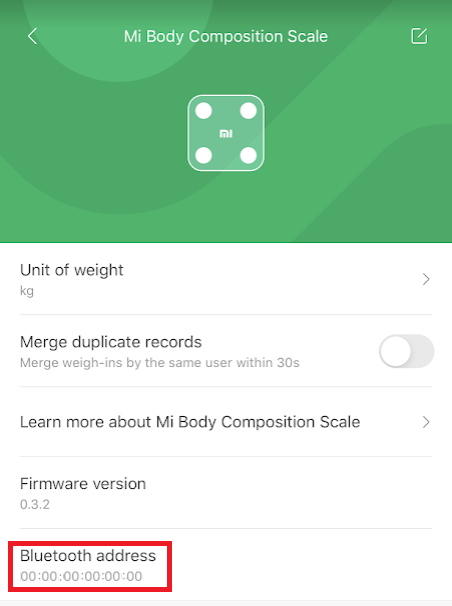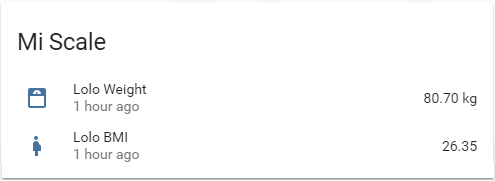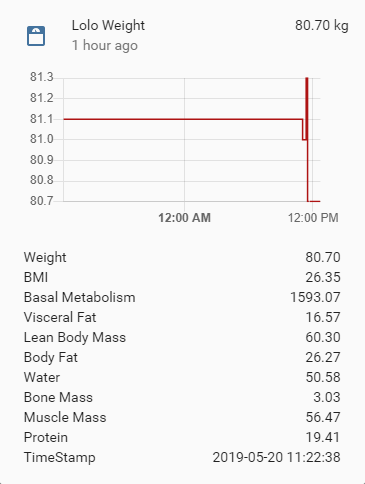Code to read weight measurements from Xiaomi Body Scales.
Please note that as off 0.2.0, the config is now located in options.json and no longer in the docker-compose / environment Please read on for for more information. This change was necessary to allow for unlimited number of users.
| Name | Model | Picture |
|---|---|---|
| Mi Smart Scale 2 | XMTZCO1HM, XMTZC04HM | 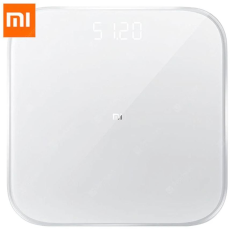 |
| Mi Body Composition Scale | XMTZC02HM |  |
| Mi Body Composition Scale 2 | XMTZC05HM | 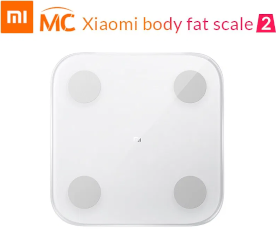 |
If using Home Assistant (formerly known as hass.io), try instead the Xiaomi Mi Scale Add-On for Home Assistant based on this repository.
- Retrieve the scale's MAC Address from the Xiaomi Mi Fit App:
- Supported platforms:
- linux/386
- linux/amd64
- linux/arm32v6
- linux/arm32v7
- linux/arm64v8
- Open
docker-compose.yml(see below) and edit the environment to suit your configuration... - Stand up the container -
docker-compose up -d
version: '3'
services:
mi-scale:
image: lolouk44/xiaomi-mi-scale:latest
container_name: mi-scale
restart: always
network_mode: host
privileged: true
volumes:
- ./data:/dataAll the config needs to be in a file named options.json. You can get a copy of one with minimum config here
List of options
| Option | Type | Required | Description |
|---|---|---|---|
| MISCALE_MAC | string | Yes | Mac address of your scale |
| MQTT_HOST | string | Yes | MQTT Server (defaults to 127.0.0.1) |
| HCI_DEV | string | No | Bluetooth hci device to use. Defaults to hci0 |
| MQTT_PREFIX | string | No | MQTT Topic Prefix. Defaults to miscale |
| MQTT_USERNAME | string | No | Username for MQTT server (comment out if not required) |
| MQTT_PASSWORD | string | No | Password for MQTT (comment out if not required) |
| MQTT_PORT | int | No | Defaults to 1883 |
| MQTT_DISCOVERY | bool | No | MQTT Discovery for Home Assistant Defaults to true |
| MQTT_DISCOVERY_PREFIX | string | No | MQTT Discovery Prefix for Home Assistant. Defaults to homeassistant |
| MQTT_TLS_CACERTS | string | No | MQTT TLS connection: directory with CA certificate(s) that signed MQTT Server's TLS certificate, defaults to None (= no TLS connection) |
| MQTT_TLS_INSECURE | bool | No | MQTT TLS connection: don't verify hostname in TLS certificate, defaults to None (= always check hostname) |
| BLUEPY_PASSIVE_SCAN | bool | No | Try to set to true if getting an error like Bluetooth connection error: Failed to execute management command ‘le on’ on a Raspberry Pi. Defaults to false |
| TIME_INTERVAL | int | No | Time in sec between each query to the scale, to allow other applications to use the Bluetooth module. Defaults to 30 |
| USERS | List | Yes | List of users to add |
Auto-gender selection/config -- This is used to create the calculations such as BMI, Water/Bone Mass etc... Here is the logic used to assign a measured weight to a user:
- If the weight is within the range of a user's defined values for GT and LT, then it will be assigned (published) to that user.
- If the weight matches two separate user ranges, it will only be assigned to the first user that matched (so don't overlap ranges!)
| User Option | Type | Required | Description |
|---|---|---|---|
| GT | int | Yes | Greater Than - Weight must be greater than this value - this will be the lower limit for the weight range of this user |
| LT | int | Yes | Less Than - Weight must be less than this value - this will be the upper limit for the weight range of this user |
| SEX | string | Yes | male / female |
| NAME | string | Yes | Name of the user |
| HEIGHT | int | Yes | Height (in cm) of the user |
| DOB | string | Yes | DOB (in yyyy-mm-dd format) |
Note: The weight definitions must be in the same unit as the scale (kg, Lbs, jin)
Note: Python 3.6 or higher is required to run the script manually
Note: this is now deprecated. It would still work provided the path to options.json is manually set in the code manually set path at line 39: with open('/data/options.json') as json_file
- Install python requirements (pip3 install -r requirements.txt)
- Open
wrapper.shand configure your environment variables to suit your setup. - Add a cron-tab entry to wrapper like so:
@reboot bash /path/to/wrapper.shNOTE: Although once started the script runs continuously, it may take a few seconds for the data to be retrieved, computed and sent via mqtt.
Under the sensor block, enter as many blocks as users configured in your environment variables.
- platform: mqtt
name: "Example Name Weight"
state_topic: "miscale/USER_NAME/weight"
value_template: "{{ value_json['weight'] }}"
unit_of_measurement: "kg"
json_attributes_topic: "miscale/USER_NAME/weight"
icon: mdi:scale-bathroom
# Below lines only needed if long term statistics are required
state_class: "measurement"
- platform: mqtt
name: "Example Name BMI"
state_topic: "miscale/USER_NAME/weight"
value_template: "{{ value_json['bmi'] }}"
icon: mdi:human-pregnant
unit_of_measurement: "kg/m2"
# Below lines only needed if long term statistics are required
state_class: "measurement"
Thanks to @syssi (https://gist.github.com/syssi/4108a54877406dc231d95514e538bde9) and @prototux (https://github.com/wiecosystem/Bluetooth) for their initial code
Special thanks to @ned-kelly for his help turning a "simple" python script into a fully fledged docker container
Thanks to @bpaulin, @AiiR42, @andreasbrett for their PRs and collaboration


